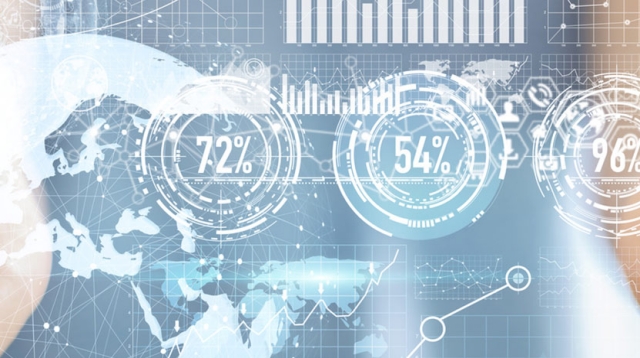

The fusion of technical & business expertise
The use of Big Data to better steer processes has become prevalent, but much confusion remains about this sweeping trend. In order to clear up some of the confusion, we recently turned to Dr. Carsten Bange, the founder and CEO of the Business Application Research Center (BARC), for answers to some of our most pressing questions. Continue reading to gain a better understanding of how companies of all sizes can use intelligent data, to learn how data can be used to optimize processes or create entirely new business models, and to ease those pesky privacy concerns in the back of your mind

GSC: Early on in your 2014 study, "Big Data Analytics: On the way to a data-driven economy", you refer to the two different sides of the big data debate ̶ on one side, there is a "big opportunity" for companies that presents itself with the extraordinary access to information, but on the other side, fear that an all-knowing "big brother"-style society is beginning to emerge. In your opinion, in what ways can big data be used to positively revolutionize the economy and the way we live? At what point does the use of personal information become dangerous?
Dr. Bange: It is important to note that many use cases for big data analytics are not using personal information (but rather machine or system log data) and are therefore not prone to create issues on privacy that you refer to. The increased usage of data to better steer processes in general is now widely understood to create business benefit. It is a fact that our society produces unbelievable amounts of data at an increasing speed and it looks like the people, companies, and countries that find the most successful ways in handling and using this data will gain an advantage. The more data we produce as and on human beings, the more pressing the issues around privacy will become. One example: on one side, using personal medical or genome data is very beneficial in finding treatments for illnesses, but on the other side, to decide and know who has access to this most private data and the more ethical question – what do I want to know from my decoded genome – is next.
GSC: As of late, "big data" has become a hotly debated topic in both large corporations and companies at the mid-sized level. While Google, Amazon, and Facebook, companies whose business models are, to a large extent, based on big data, have been making waves for years with their sometimes unorthodox use of customer information, many top executives are just beginning to learn about the intelligent use of data. Are big data analytics useful for companies of all sizes? How can the results be used to improve a company's performance?
Dr. Bange: There is no correlation between the size of a company and the benefit intelligent use of data can bring. It depends more so on the business model and the level of competitive pressure and competitive advantage that data can bring to the table. Especially in the online world, there are many companies that are quite small but their success is determined by understanding people's behavior on their web sites or online applications and the usage of data collected from their customers, prospects, and outside sources. The better their analysis and the decisions derived from them, the more successful they are. In the physical world there are also examples of small companies making intelligent use of data: Small food retailers using predictive models for their assortment and campaign planning, or small service companies that are smart in using information and building models. A good example for the last category is a service company for transportation companies that can create a very accurate forecast of the likelihood that a truck driver will be involved in an accident on a given day. All based on data that is available, but that the large company today does not know how to use it.
GSC: A common misconception about big data analytics seems to be that the technology will solve business problems on its own, all while increasing revenue, decreasing cost, and attracting customers. Can you offer any advice to firms just starting out with big data analysis? What expectations are realistic and how can they begin to use their data effectively?
Dr. Bange: There are two areas. One is to improve processes using data and the other is to come up with new business models based on data. For both, creativity and knowledge about the business is paramount. The first question is, where in my processes could I benefit from more data or better use of data? All decision processes are often a good starting point – where are decisions taken to steer a process and how could that be improved when more internal or external data would be (more quickly) available? Looking at decisions that are based on predictions are also often a good starting point to see whether a model can be built that improves these decisions. Once some of these areas are identified, it is important to build a quick proof of concept to understand whether there really is benefit and then incorporate this more exploratory approach on data into the organization. It is most important to bring technical and business expertise together and give these people the opportunity to test ideas with trial and error – and not set up a project where the project manager gets fired when a predefined goal is not met in time.
GSC: Over the past two decades, manufacturers have implemented a variety of lean techniques to reduce waste and variability during production processes while, at the same time, improving product quality and yield. What additional benefits can big data analytics offer to a sector that has already become relatively efficient?
Dr. Bange: You are right ̶ the focus in manufacturing companies has been on optimizing processes. But now with the advance of digitalization, the attention shifts towards the data. Analysis of data enables us to further improve the steering of processes, e.g. with ‘predictive maintenance' we can use algorithms to learn from sensor data that catches the status of a machine to predict failure of that machine. This helps to better plan machine maintenance, save costs, and achieve increased availability at the same time. Only with these modern data-driven approaches can a manufacturing company succeed in the major change from being a hardware producer to a service provider – the ultimate challenge for new business models and competitive advantage in the future.
GSC: A number of futuristic books have been released in recent years (e.g. Dave Eggers' The Circle) warning of a world under constant surveillance and lacking any notion of individual privacy. With the advances being made in big data methods and tools for analysis, do you foresee the emergence of such a state? What steps can we take in order to avoid the total loss of privacy?
Dr. Bange: The use of technology can already today provide a very complete picture of a person using technology like cell phones, credit cards, social media, or just moving in a public space that is under surveillance. And who would want to refrain from using these technology advancements? So a key question is to come up with privacy laws that make sure that 1) people know what is happening with their data and any ‘service for data' business models we see (e.g. at Google or Facebook) are clearly pointed out, 2) data can be handed over to other organizations only with explicit approval to ensure that organizations have the data they need but not more, and 3) focus law enforcement on using big data to investigate suspects und prosecute criminals and not do mass surveillance that limits individual freedom.
GSC: Thank you for this interview, Dr. Bange.
More information: http://barc-research.com/
